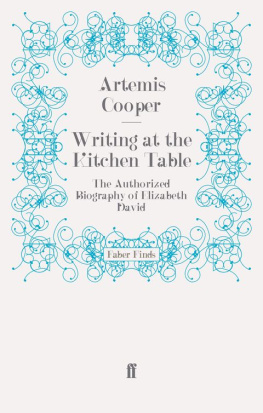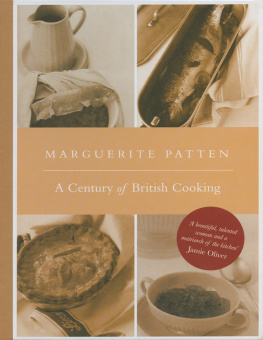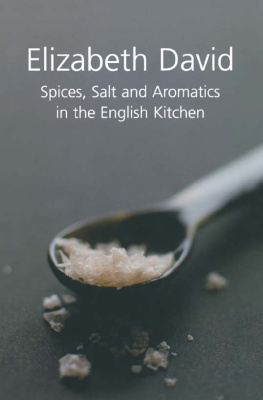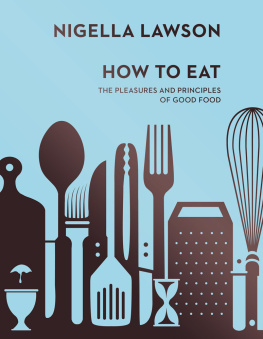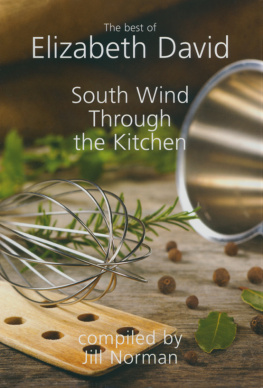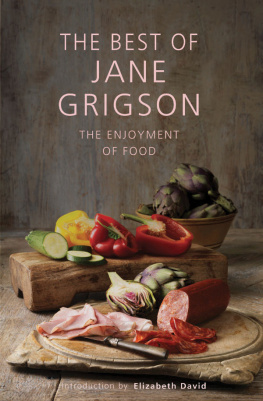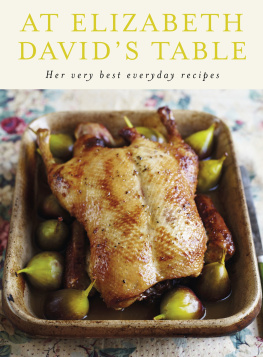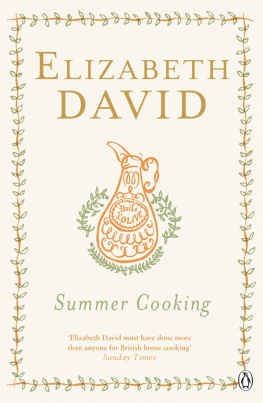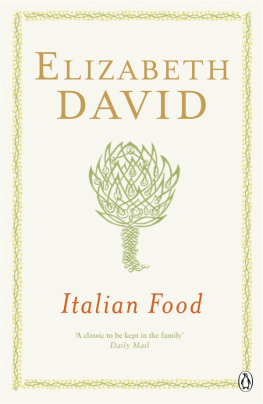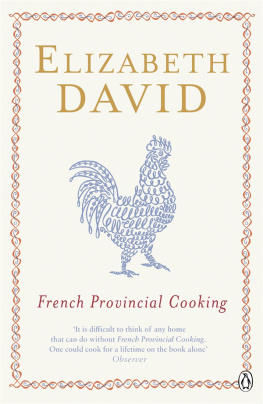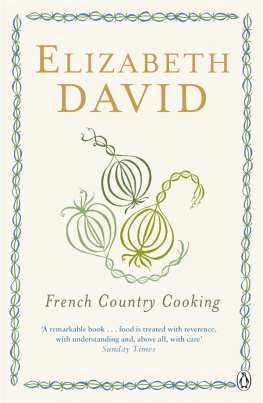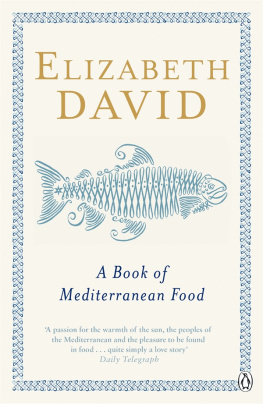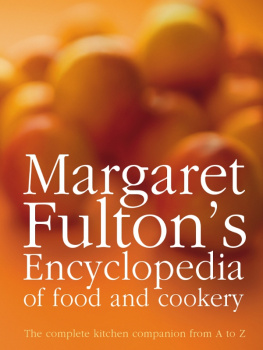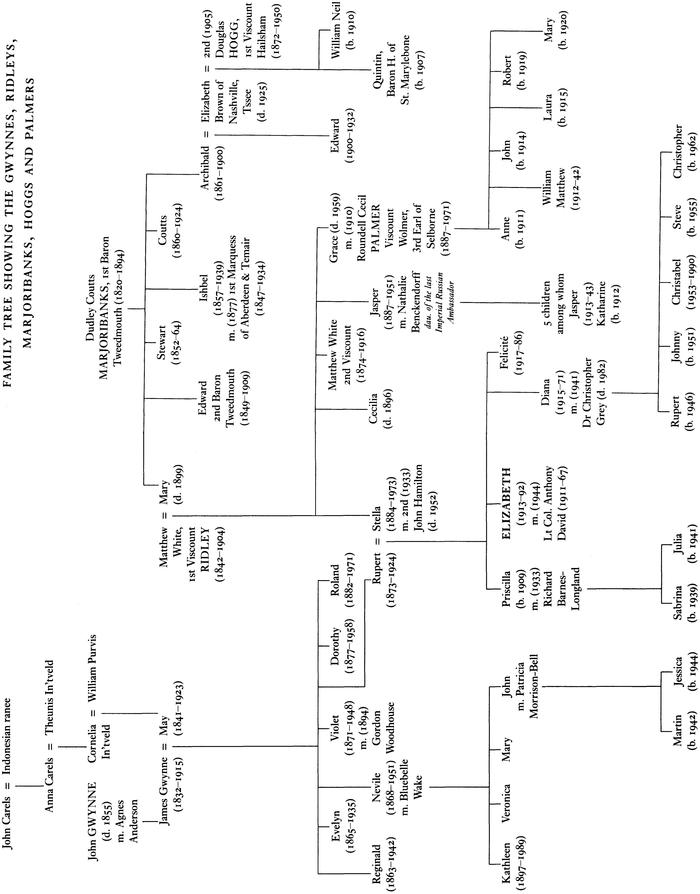On 22 February 1994, two years after Elizabeth Davids death, the contents of her two kitchens at 24 Halsey Street, Chelsea, went on sale at Phillips auction rooms in Bayswater. The press had taken up the story as soon as the forthcoming sale was announced, showing photographs of pots and pans, spoons and storage jars, all displayed on her scrubbed-pine kitchen table. Cookery writers and chefs were invited to choose items they coveted or might bid for. From the moment viewing began, a steady stream of people made their way to the showrooms. They were private individuals, not professional dealers, and they spent hours poring over cheese graters and ramekins which could have come from a junk shop.
The day itself took everyone by surprise. The saleroom was packed by nine-thirty in the morning, and the auction, scheduled to take place at midday, was delayed by the crush. We brought in every chair we could, said one of the saleroom staff, but the crowd was unbelievable. They were out in the corridor and all the way down the stairs. There must have been three hundred, perhaps four hundred people and there was this sense of excitement, of electricity. Ive never seen anything like it.
When the proceedings finally began, the auctioneer was almost overwhelmed by the sheer volume of bids. People wanted something, anything, even if they didnt know what it was. I dont know exactly what Ive bought, said one woman after paying 75 for a lot. I just wanted to have some keepsake. One of Elizabeths friends recalled how odd it was to see little things that he had given her go for fifty to a hundred pounds. Some people had their eyes on certain pieces: Prue Leith was determined to buy the kitchen table, and a roar of approval went up from the crowd when the table went to her for 1,100. Leith rose to her feet with a whoop of delight, and took a little bow amidst a round of spontaneous applause. Im going to cook on it just like she did, and think of her, said Prue Leith afterwards. She was the most important cookery writer this century. Thats why I wanted her table. I cant believe Ive got it. By the end of the afternoon the sale had made 49,000 more than three times its estimated value. The bidders had not bought pots and wooden spoons, but relics: fragments from someone they had never met, but who had had such an effect on their lives that they wanted to keep a little piece of her for ever.
*
Elizabeth Davids reputation rests primarily on her first five books. ABookofMediterraneanFood appeared in 1949 while England was still in the grip of rationing. Her aim was to bring a flavour of those blessed lands of sun and sea and olive trees into English kitchens. At a time when aubergines, lemons and olive oil were almost unobtainable , the books success amazed both her and her publishers. What Elizabeth had managed to do, in this book and those that followed, was to describe food in such a way as to make people dream of it and want to cook it.
Timing was with her. After the dismal years of war and post-war austerity, the world was opening up. People started travelling as never before, and they were not afraid of garlic and wine sauces as their parents generation had been. At the same time, new transport systems were established which brought foreign food hitherto unavailable in English shops. Some of Elizabeth Davids staunchest supporters declare that it is due to her alone that we can now find Italian olive oil, red peppers and Israeli avocados in every supermarket. This must be an exaggeration, but there is an argument for saying that, in her quiet way, she was the most influential cookery writer of her time. There is scarcely a professional cook of any distinction in these islands who does not acknowledge her as an inspiration. She also taught a whole generation of people how to think about food in ways they never had before, and how to cook the simple, authentic dishes she described. Elizabeth never approached cooking as a chore. It was hard work, certainly, but her writing made cooking a creative act to be enjoyed for its own sake, not something to be got out of the way.
There was also something compelling about her writing. On the surface, it seemed admirably spare, straightforward and to the point. But behind those crisp sentences, one can feel the pressure of her loves and hates, her enthusiasm and her passion. The reader becomes acutely aware of these emotions, although they are never mentioned. This is what makes her prose so powerful, and why she inspired a whole generation not only to take up cooking, but to plunge into it with her own kind of serious enjoyment. I think, she wrote, that the ideal cookery writer is one who makes his readers want to cook as well as telling them how it is done; he should also leave something, not too much perhaps, but a little, unsaid; people must make their own discoveries, use their own intelligence, otherwise they will be deprived of part of the fun.
*
About her private life, Elizabeth left everything unsaid. She hated publicity of any kind, and revealed very few clues about the sort of person she might be. The photographs in the press showed an elegant, rather beautiful woman with clever, cat-like eyes. She wore well-cut, classical clothes, and emphasized her long neck with white shirts open at the throat. Sometimes there was a photograph of her crowded kitchen, with its French armoires and bowls of eggs and lemons on the dressers; but that was as close as the public ever got to her private life. Everything I want to say is in my books, she maintained. She gave out nothing else, and anyone foolish enough to ask an impertinent question would shrivel up in the frozen silence that followed.
*
Fortunately for the biographer, the crockery and kitchen equipment sold at Phillips had not been the only things she left behind. In her house in Halsey Street, books spilled out of every available bookshelf. They had taken over the sitting room to such an extent that the floor was an obstacle course and there was nowhere to sit down. They had advanced up to the first floor in little piles on each stair. Her bedroom contained more bookshelves, also full to bursting; and there was a subsidiary library in her kitchen. She had never been able to acquire them on an expensive scale, but her books made a magnificent collection on the history of cookery and gastronomy in English, French and Italian. First choice went, as she had instructed, to the Warburg Institute. The rest went to the Guildhall Library.
There were also, in every room, innumerable files and cardboard boxes of papers, notebooks, correspondence and catalogues. Elizabeth had appointed her long-time editor and friend Jill Norman to be her literary executor, and before the house in Halsey Street was sold, Jill and her husband Paul Breman moved the archive to their house in Hampstead.
*
I never met Elizabeth David, although I did talk to her once on the telephone. I was just beginning a book about Cairo during the Second World War when a friend gave me her telephone number. She was a considerable name. I had two of her books and was very keen to meet her, but I had also been told that she could be difficult. While I summoned up the courage to dial, I wrote out what I wanted to say on a piece of paper.

